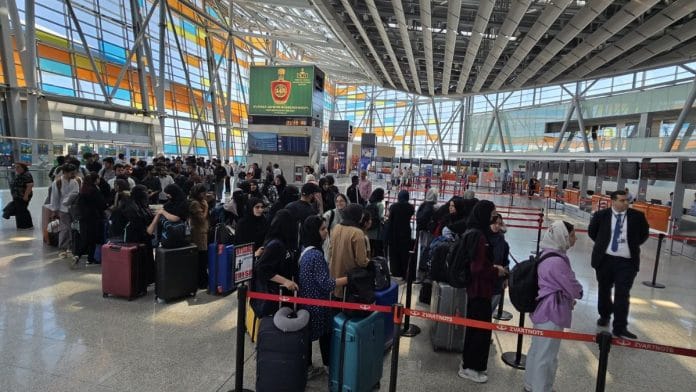New Delhi: The Ministry of External Affairs (MEA) Wednesday said it had successfully evacuated 110 students from Iran under Operation Sindhu amid its ongoing conflict with Israel.
In a statement, the MEA said that, in the initial phase of the operation, the students were evacuated from the northern part of the country, travelling by road to Yerevan, the capital of Armenia, on 17 June. From there, they boarded a special flight at 2:55 pm on 18 June and were expected to arrive in New Delhi in the early hours of 19 June.
“The students have travelled by road to the Armenian capital, Yerevan, under the supervision of our Missions in Iran and Armenia. These students departed Yerevan on a special flight at 1455 hrs on 18th June 2025 and will arrive in New Delhi in the early hours of 19th June 2025 as part of the initial stages of Operation Sindhu,” the statement read.
The Indian government also expressed gratitude to the governments of Iran and Armenia for their cooperation and support in facilitating the evacuation.
“The safety and security of Indian nationals abroad remain a top priority,” the MEA said in a statement, adding that the Indian Embassy in Tehran has been actively assisting Indian citizens in relocating from high-risk zones within Iran to safer areas as part of the broader evacuation plan.
Operation Sindhu begins ??.
India launched Operation Sindhu to evacuate Indian nationals from Iran. India evacuated 110 students from northern Iran who crossed into Armenia under the supervision of our Missions in Iran and Armenia on 17th June. They departed from Yerevan on a… pic.twitter.com/8WJom7wh5f
— Randhir Jaiswal (@MEAIndia) June 18, 2025
Indian nationals in Iran have been urged to stay in regular contact with the Indian Embassy in Tehran and the 24/7 Control Room set up by the MEA in New Delhi. Emergency helplines are operational to provide assistance and guidance to those still in affected regions.
Tensions in West Asia escalated sharply after Israel launched Operation Rising Lion on 13 June, targeting Iranian nuclear sites, senior military officials and Iranian nuclear scientists.
Iran retaliated with Operation True Promise 3, launching ballistic missiles at Israel.
As the conflict has intensified, US President Donald Trump has urged all civilians in Tehran to evacuate “immediately” and hinted at possible US intervention. The G7 has issued a statement blaming Iran for regional instability and reaffirmed that Tehran must not acquire nuclear weapons.
Meanwhile, India has called for calm and renewed dialogue. Prime Minister Narendra Modi reiterated that “this is not an era of war” during a joint press conference with Cyprus President Nikos Christodoulides. External Affairs Minister S. Jaishankar had already been coordinating with Armenia and the UAE to facilitate safe exit routes for Indian nationals from Iran.
(Edited by Sanya Mathur)






